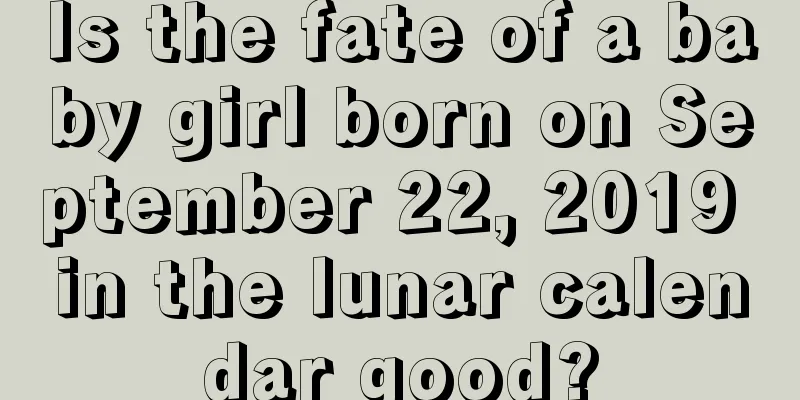Is the Dragon Boat Festival a legal holiday? What is the origin of the Dragon Boat Festival?

Introduction: The Dragon Boat Festival is an important traditional festival. So is it a legal holiday? What is the origin of the Dragon Boat Festival? Pomegranate flowers are in full bloom in May of the lunar calendar. Han Yu has a poem that says "The pomegranate flowers in May are bright to the eyes". If you want to know more about May of the lunar calendar in 2019, come to Mr. Shui Mo!Is Dragon Boat Festival a legal holiday?Dragon Boat Festival is a legal holiday!1. The total number of national statutory holidays is 11 days; 2. Adjustments to the schedule of national statutory holidays: New Year's Day will remain at one day; Spring Festival will be a three-day holiday, with holidays on the first, second and third day of the first lunar month; The May 1 International Labor Day will remain unchanged; the National Day on October 1 will be a three-day holiday; the Qingming Festival, Dragon Boat Festival and Mid-Autumn Festival will be added as national statutory holidays, each with a one-day holiday (if the lunar calendar holiday falls in a leap month, the first month will be the holiday). The Dragon Boat Festival holiday arrangement in 2019: June 7 to June 9, 2019 will be a 3-day holiday, which will be combined with the weekend. What is the origin of the Dragon Boat Festival?The origin of the Dragon Boat Festival: commemorating Qu YuanAccording to the "Biographies of Qu Yuan and Jia Sheng" in "Records of the Grand Historian", Qu Yuan was a minister of King Huai of Chu during the Spring and Autumn Period. He advocated the selection of virtuous people and the empowerment of them, the enrichment of the country and the strengthening of its military, and strongly advocated an alliance between Qi and Qin. He was strongly opposed by aristocrats such as Zi Lan. He was slandered and resigned, driven out of the capital, and exiled to the Yuan and Xiang River basins. During his exile, he wrote immortal poems such as "Li Sao", "Heavenly Questions" and "Nine Songs", which were full of concern for the country and the people. These poems are unique in style and have far-reaching influence (hence, the Dragon Boat Festival is also called the Poet's Day). In 278 BC, the Qin army captured the capital of Chu. Qu Yuan was heartbroken to see his country being invaded, but he could not bear to abandon his country. On the fifth day of May, after writing his last work "Huaisha", he threw himself into the Miluo River with a stone and died, thus composing a magnificent patriotic piece with his life. Legend has it that after Qu Yuan's death, the people of Chu State were deeply saddened and flocked to the Miluo River to pay tribute to Qu Yuan. The fishermen rowed their boats and searched the river for his real body. A fisherman took out rice balls, eggs and other food prepared for Qu Yuan and threw them into the river with a "plop, plop", saying that the fish, lobsters and crabs would be full and would not bite Qu Yuan's body. When people saw this, they followed suit. An old doctor brought a jar of realgar wine and poured it into the river, saying that he wanted to drug the dragons and water beasts so as not to hurt Doctor Qu. Later, in order to prevent the rice from being eaten by dragons, people came up with the idea of wrapping the rice in neem leaves and wrapping them with colored silk, which developed into rice dumplings. From then on, on the fifth day of May every year, there was a custom of dragon boat racing, eating rice dumplings and drinking realgar wine to commemorate the patriotic poet Qu Yuan. The origin of the Dragon Boat Festival: In memory of Wu Zixu It is widely circulated in Zhejiang area to commemorate Wu Zixu of the Spring and Autumn Period. Wu Zixu was named Yuan. He was a native of Chu. His father and brother were both killed by the King of Chu. Later, Zixu turned to the light and fled to the State of Wu, helping Wu to attack Chu. After five battles, he entered the capital of Chu, Yingcheng. At that time, King Chu Ping had died. Zi Xu dug up his tomb and whipped his corpse 300 times to avenge the murder of his father and brother. After the death of King Helu of Wu, his son Fuchai succeeded to the throne. The morale of the Wu army was high, and they won every battle. The Yue Kingdom was defeated. King Goujian of Yue asked for peace, and Fuchai agreed. Zixu suggested that the State of Yue should be completely destroyed, but Fuchai did not listen. Wu's Prime Minister Bo Pi was bribed by the State of Yue and slandered Zixu. Fuchai believed it and gave Zixu a sword, which led to Zixu's death. Zixu was a loyal and honest man who was ready to face death with equanimity. Before his death, he said to his neighbors, "After I die, dig out my eyes and hang them on the east gate of Wujing, so that I can watch the Yue army enter the city and destroy Wu." Then he committed suicide. King Fuchai was furious when he heard this, and ordered Zixu's body to be taken, wrapped in leather and thrown into the river on May 5th. Therefore, it is said that the Dragon Boat Festival is also the day to commemorate Wu Zixu. The origin of the Dragon Boat Festival: In memory of the filial daughter Cao E Cao E was a native of Shangyu in the Eastern Han Dynasty. Her father drowned in the river and his body was missing for several days. At that time, the filial daughter Cao E was only fourteen years old and she cried along the river day and night.Seventeen days later, on May 5th, he also jumped into the river and carried out his father's body five days later. This became a legend and was then passed on to the county governor, who ordered Du Shang to erect a monument for him and asked his disciple Handan Chun to write a eulogy to praise him. The tomb of the filial daughter Cao E is located in Shaoxing, Zhejiang Province today. It is said that the Cao E stele was written by Wang Yi of the Jin Dynasty. To commemorate Cao E's filial piety, later generations built the Chang'e Temple at the place where Cao E jumped into the river. The village where she lived was renamed Cao'e Town, and the place where Cao E died for her father was named Cao'e River. The Origin of the Dragon Boat Festival: Ancient Yue Totem Festival A large number of unearthed cultural relics and archaeological research in modern times have confirmed that in the vast areas of the middle and lower reaches of the Yangtze River in the Neolithic Age, there was a cultural relic characterized by geometric stamped pottery. According to experts, the ethnic group of the remains was a tribe that worshipped the dragon totem, known in history as the Baiyue tribe. Baiyue is also written as Baiyue (Yue and Yue are interchangeable), referring to the Baiyue indigenous people in the Yue area of South China. Also known as the Yue tribe, the ancient Yue tribe, the Yue people, and the ancient Yue people, it refers to the ancient tribes living in the ancient southern Yue land. There were many branches of Baiyue, among which the major tribes of Baiyue such as Ganyue, Yangyue, Dong'ou, Minyue (Minyue people), and Nanyue (Nanyue people); Xiou, Juyue, Luoyue, etc. evolved into modern Zhuang-Dong language peoples, such as Zhuang, Dai, Li, etc., as well as Kinh, Tai, Lao, Thai, Shan, Ahom and other ethnic groups in Vietnam, Laos, Thailand, Myanmar and India. The patterns on the unearthed pottery and historical legends indicate that they had the custom of cutting their hair and tattooing themselves, lived in water towns, and regarded themselves as descendants of dragons. Most of their production tools were stone tools, but there were also small bronze tools such as shovels and chisels. Among the jars and pots used as daily necessities, the stamped pottery tripods used for cooking food are unique to them and are one of the symbols of their ethnic group. The Baiyue people still existed until the Qin and Han Dynasties, and the Dragon Boat Festival was a festival they created to worship their ancestors. During thousands of years of historical development, most of the Baiyue people have been assimilated into the Han nationality, and the rest have evolved into many ethnic minorities in the south. Therefore, the Dragon Boat Festival has become a festival for the entire Chinese nation. The new year of 2019 has already begun. Will you be able to find your soulmate this year? Is your love luck good? Welcome to click on the "Premium Calculation" below to accurately calculate your love pattern. I wish you can find the right soulmate soon! |
>>: Is it necessary to eat rice dumplings during the Dragon Boat Festival? The meaning of Zongzi
Recommend
Is it suitable to set up a bed on the 21st day of the first lunar month in 2022? What are the precautions and taboos when setting up a bed?
The first month of the lunar calendar is the month...
Is October 7th, 2017 a good day? Is it suitable for burial?
The tenth month of the lunar calendar is a beautif...
Minor Cold Poems and Ancient Poems Related to Minor Cold
Thousands of miles of ice and snow cover the land,...
What are the taboos during the Beginning of Autumn solar term? Taboos during the solar terms before and after the Beginning of Autumn!
The summer sun scorches people, and those who have...
What flowers are suitable for tomb sweeping on Qingming Festival in 2020? Is it taboo to hold a funeral on the second day of Qingming Festival in 2020?
Introduction: Tomb sweeping during the Qingming Fe...
How auspicious or inauspicious is the time of the Little New Year? Is it an auspicious day?
Introduction: Xiaonian is a traditional Chinese fe...
Why do we eat mooncakes during the Mid-Autumn Festival? Who does the Mid-Autumn Festival commemorate?
Introduction: The Mid-Autumn Festival is a festiva...
The 20th day of the first lunar month in 2019 is not a good day for haircuts. Is this day good or bad?
Although it is not customary to shave your hair in...
WeChat greetings for Children's Day in 2021, Children's Day greetings copywriting
In early June 2021, we welcomed Children's Day...
What are the taboos on the tenth day of the first lunar month? What should I pay attention to?
Introduction: The tenth day of the first lunar mon...
Is it suitable to travel on October 23, 2018? Is it a good idea to travel far on October 23, 2018?
Introduction: According to the tradition in our co...
Is it a good idea to repair graves on September 11, the day after Cold Dew in 2019? Will it still be hot during Cold Dew?
Introduction: Repairing graves is an important mat...
Introduction to the legend of the origin of New Year's Day. What is New Year's Day also called?
The first day of the new calendar every year is al...
Is it good for a boy born on June 20, 2020? What is the zodiac sign of the sixth month in the lunar calendar?
Introduction: People born on different days have d...
What is the zodiac sign of people born on December 14, 2017? What is the personality of an Aquarius man?
In fact, personality needs to be divided into male...









